If you could live anywhere, where would it be?
Would you be happier, and how would you show your gratitude?
Dear readers, dear friends,
I am sitting on the lakeshore in a public park thinking, relaxing, and writing to you. The air is warm and there are young midges, or at least that’s what I’m calling these thoughtless and fragile bugs, and they are flying into my face and hair. They are annoying, but they don’t mean to be.
My daughter is at swim team practice, which provides me some time to myself several times throughout every week. I feel lucky lucky to have these little retreats, and also to live by some beautiful bodies of fresh water. The region where I live is called Teejop in the native Hoocąk, or Ho-Chunk language. It translates as four lakes, and there are more sacred mounds found on the shores of these lakes than anywhere else in the world. People have lived here for a very long time, and it is a good place to live.
I came across the Orion Magazine questionnaire with the poet Ross Gay a week or so ago and I’ve been thinking about it. He was asked, “If you could live anywhere, where would it be?” He responded:
A place where I could garden, walk to a decent spot for coffee and food and some groceries, where there are trees, very good friends within easy walking distance, a bookstore and/or library walkable or bikeable at least, where there are beautiful places for gathering, plazas or parks that work (see Christopher Alexander et al), some basketball courts, a place where not everything is oriented around cars, i.e. pedestrian friendly, lots of trees, lots of forageable stuff (mulberries, serviceberries, black raspberries, etc.), probably a significant waterway nearby, a place where I’d know and have occasion to hang out with some of the people who grow my food, a culture of gardening actually, and a potluck culture, and good movies nearby, etc.
- Ross Gay, Orion Magazine
I really like this train-of-thought-like response because it is an expression of gratitude for simple delights. If you have read his collection, “The Book of Delights,” or it’s follow-up, you’ll recognize he is mostly describing his life where he lives. It might be worth noting, but maybe not, that he lives in Indiana and could probably, at this point in his life, live wherever he wants.
I have been fortunate to have agency and choice about where I want to live, and feel settled at this point. But the question of what makes a good place to live intrigues me, so I was quick to click open an article on Substack by
entitled “Are you happy? Depends where you live.”It turned out to be a fantastic summary of some really interesting research! Read it yourself for more detail, but studies have shown that being happy isn’t about finding the best place to live. Russell’s article points to the fact that it’s yet another way that an individualistic pursuit of constant happiness has caused harm to our psyches. A culture that supports the natural human emotional cycles, the ups and downs of living anywhere, allows people to be happier on the whole. Being happy depends more on being part of a culture that accepts sadness, disappointment, and loss as part of life.
Perhaps the individualistic pursuit of the best, better, and more is also why we too often forget to be grateful for the simple delights, like a ‘decent spot for coffee’ and for all the food growing around us. Or a few moments of down time between shuttling a kid to sports practice.
As I’ve said here before, I have learned a lot from Robin Wall Kimmerer’s book “Braiding Sweetgrass.” For me one of the most welcome but radical messages that comes through in her essays is a generous invitation to become indigenous. By that I mean the call to learn one’s home place and to express gratitude for all the ways the earth supports and nurtures us here and now, wherever we are.
I have gotten to choose, and I chose to live in Teejop. It is where I am raising my kids to feel at home, but I’m only just learning how to express gratitude of the kind that Kimmerer describes.
The feeling comes more readily, but then what do I do about it? What is the outward symbol and ritual of this deep humility and reverence? My own spiritual leanings started on a yoga mat nearly three decades ago, so I am drawn to invitations to learn more from the ancient and indigenous practices of places very far away and cultures very different from mine. Yoga is a wisdom tradition that I’ve learned a lot from, so last fall I continued my studies with an exploration of a Sanskrit mantra known as Sri Sukta. A small group of us met with teachers, including my friend Amie Heeter (who will share more about this below), to get a deeper appreciation for the ancient hymn. It comes from the Vedas and is chanted in devotion to the supportive, healing, nurturing Divine Mother - the earth and giver of life. I committed to spending time every day, for 80 days, with the specific sounds that were, in the beginning, unfamiliar and indiscernible to me.
To let the sounds sink in, the teachers created a recording of the 15+1 stanzas. It takes about twenty-five minutes to go through the repetitions of Sri Sukta.
This is a true story: On the first day, I got up before sunrise to walk. I left my house and headed to the river, then to the lakeshore, then looped back home through a park along a lagoon. The sun was getting higher at this point, but it was still calm and quiet. It was early autumn and the light was soft and gauzy. I approached my house and saw something sitting in the middle of the sidewalk. The light blue bundle was an opened but full bag of loose American Spirit tobacco. I leaned down to pick it up and understood the message as if the Divine Mother herself said it out loud to me: This is your path. Say your prayers. When you walk to the waters, express gratitude. Offer tobacco.
I am pretty sure that I laughed out loud. The thing is, I know that people who have been living in this place, Teejop, have been offering tobacco as an expression of gratitude for a long, long time. I walked through into my house after that first day of practice elated. For the next seventy-nine days, I sprinkled a little bit of tobacco at the edge of the river, the lake, and the lagoon - a closed circle of water created from marshland so that houses like mine could be built (probably on top of a mound, but that’s another story).
It felt awkward to be making up my own ritual with Sanskrit words and American Spirit tobacco, but everything about how we are living today is odd, in evolutionary terms. We are all mixed up, taking and leaving lessons and making meaning in new and old ways. I am kind of like a midge, thoughtless and fragile and annoying. But we have just the one short life.
I didn’t intend to share that story, but now that I’ve written it up, I will leave it here. And because I trust that you, dear reader, appreciate the wandering path of an open and relaxed mind during a pause on the shore of the waters, I’ll accept that this must be the moment to introduce my friend, Amie Heeter.
When Amie returned from India earlier this year, I asked if she might like to contribute something to Wanderlife. She graciously agreed. In her responses to a few questions I asked, Amie shared some things that feel extremely fitting to this particularly moment. Her lifelong and dedicated search for meaning and for living meaningfully has inspired me for years — you can watch her TEDx talk about pressing pause for a year of exploring the unknown here. As a fellow parent of children around my kids’ ages, and someone who frequently expresses her gratitude for the fresh waters of this larger Great Lakes region, I am always learning so much from Amie! I know you will enjoy her thoughts on practice, commitment, and coming home as much as I have.
Thanks for reading! Thanks for taking a moment to share you thoughts in the comments or to share this post with a friend. And if you feel inclined, the modern gesture of gratitude that is clicking on the little heart actually does warm my own real heart, so thank you!
Sincerely,
A Wanderlife Questionnaire with Amie Heeter
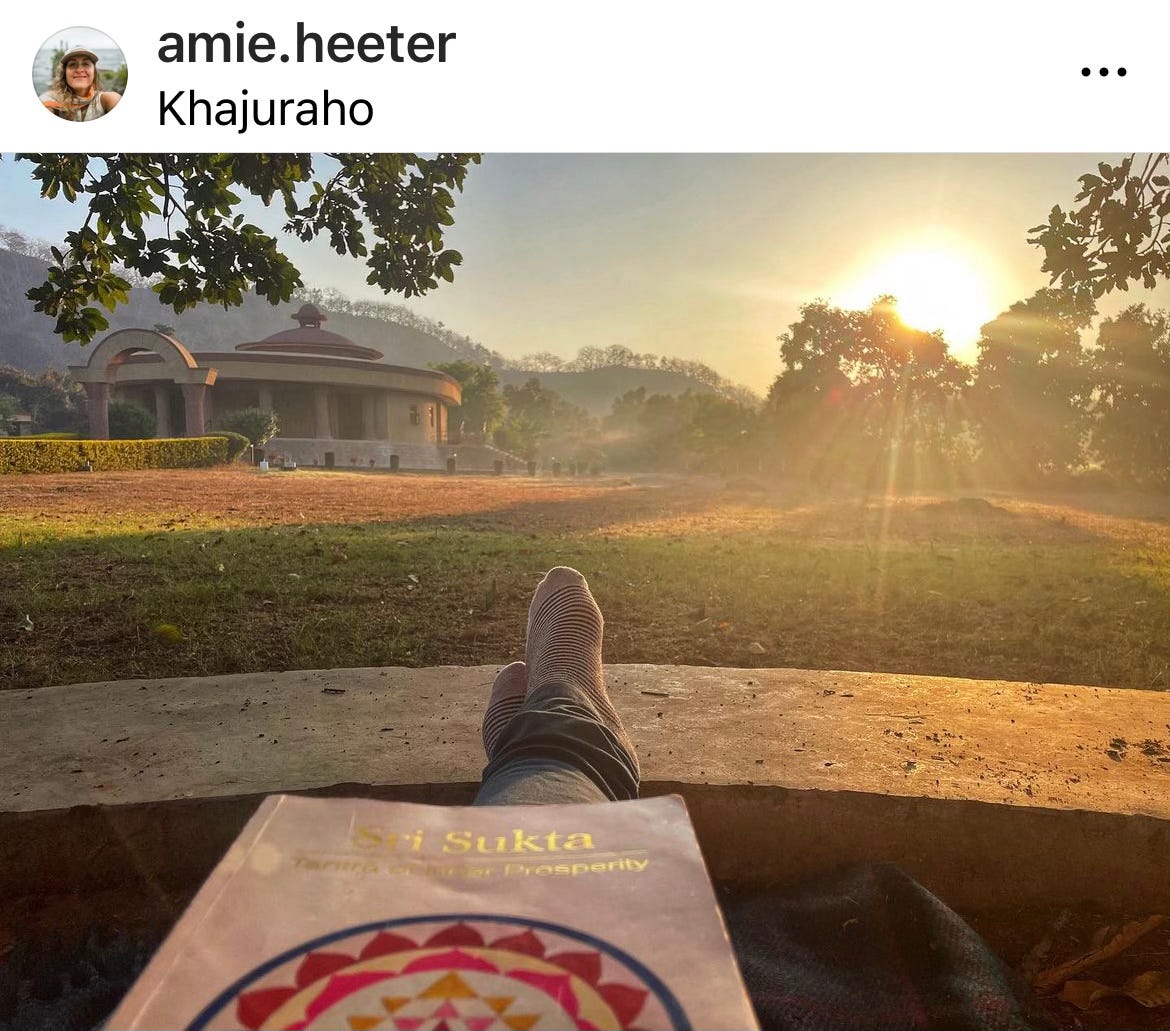
Thoughts on making space for deep journeys, figuring out how to be free, and coming home.
Q: What inspired you to leave your family and go to India alone, again? How would you describe the experience?
Amie: I've been in relationship with the unseen, or maybe another way to put it is that I’ve been spirit led, since my earliest memories. It took me some time to figure out how to be here in this world without feeling like an alien.
Yoga really touched my life when I encountered it in 1999. Its underlying philosophy felt resonant to what I was seeing and experiencing. It's the freest path I've found.
In 2010, I went all in and became initiated in a tradition called Sri Vidya Tantra, an unbroken lineage from way back in the Himalayas. I go to India to be in a more direct relationship with that stream of knowledge and the practices that support that knowledge. There I have the opportunity to go deep with that spirit-led part of me that is very difficult to do as a householder living day to day. (householder is term for people who choose to follow a spiritual practice while living within a family instead of living as renunciants in monasteries)
India is like no other deeply spiritual place I've encountered. The ancient underpinnings of this incredibly multifaceted culture are still intact and woven alongside a modern expression that is so outside of my Western frame. Their devotion is relentless, and you can be in the most unassuming place up on a hill that has a little humble shrine carved into a rock I'd barely notice if it wasn't pointed out, and feel knocked over by the presence seeded there from practices done continuously for centuries. You just never know what you'll experience, and you really have to let go of all sense of expectation and comfort when entering that fascinating land. It's taught me immense humility and gratitude, and so I go to steep in that tradition and what that place is still revealing.
Q: What did you learn about yourself? About life? About death?
Amie: The trip I took in early 2024 was organized around a dedicated practice of reciting and contemplating an ancient mantra called the Sri Sukta with about 25 others from around the world who came together for this 12 day event. Partly this ancient hymn is about invoking the healing forces of nature to help heal the planet, and partly it's about being in relationship with this teaching of Sri - that underneath all the chaos, suffering, and confusion in this world - that we are being supported all the time, and that the essence of this support is inherently benevolent and beautiful. Through the practices, I understood that nature ultimately is organized to be an expression of an interconnected web, of Sri, and we are no different. I learned that it's not a question of if this force is there, it's instead: am I seeing it?
The specific practices - and this specific mantra - are simply meant to help us see this underlying reality and experience it as real. I learned it's real, and I don't have to wait until death to see it. Things I saw and experienced there are difficult to explain, but they revealed this teaching to me. The real practice is coming home, and continuing to experience this underlying reality when not in this very concentrated practice and environment! It's a wondrous and lifelong pursuit I'm just lucky to be a part of. May my life be an offering to this life affirming and beautiful presence that has gifted me so much wonder through the decades, no matter what I named it.
Q: What did you bring home with you?
Amie: An incredible sense of groundedness, of contentment, and inspiration around what's next. We are living through some truly epochal times, and part of that massive shift culturally in the West is the amount of information that comes at us on a daily basis, with only a fraction of it able to be processed.
Our nervous systems are taxed from the firehose pace of this digital era, and the blowback shows up in diminished quality of sleep, heightened anxiety and depression, and immune depletion. I was able to be in this rural ashram campus where the wifi didn't even work and my international phone plan had no signal, so I went fully analog. This forced slowing down. Massive simplification did wonders for my nervous system, though admittedly it felt weird at first. My mindset completely shifted, and my aspirational tendencies flowed right out of that.
I'm mapping the year ahead with what came through there. I know the power of pressing pause and talk about it often, but this quality of pause was revelatory. I recognize the privilege of being able to do that, but I've essentially organized my whole life around being able to take them in small and sometimes larger ways. I tend to get lost otherwise.
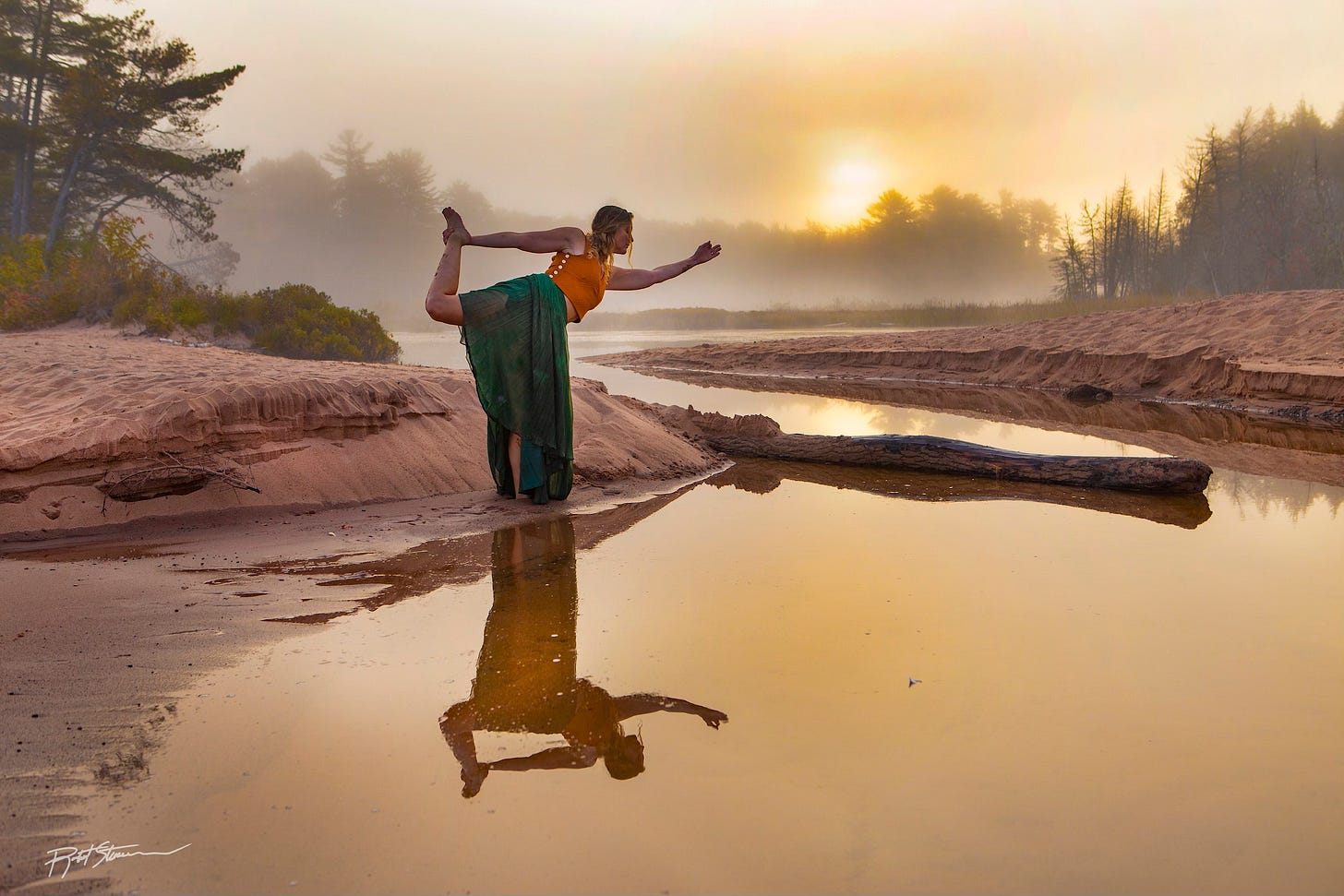
Q: How old are you? Is there another age you associate with yourself in your mind?
Hmmm, I don't think about age in the sense of being a particular one. I am young at heart but I've always been mature, even as a child. I can say I've loved my 40's! This is the decade I've felt most comfortable in who I am. I turned 48 in March!
Endnote: Amie took a year off to travel the world with her husband and two daughters. What they learned about life and the natural world around them is a lesson in the power of disconnecting to reconnect. Watch her TedX talk here or visit her website.


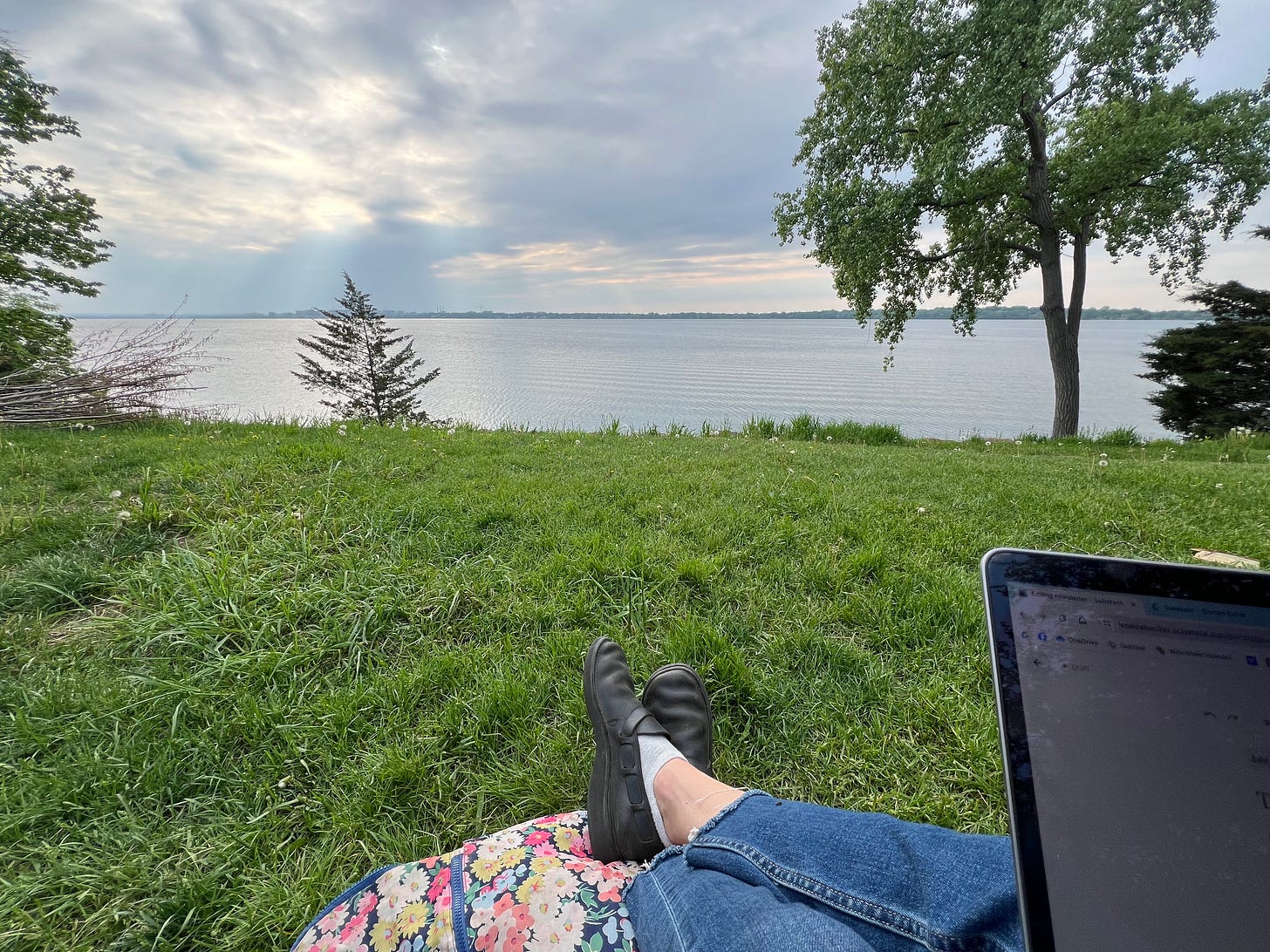

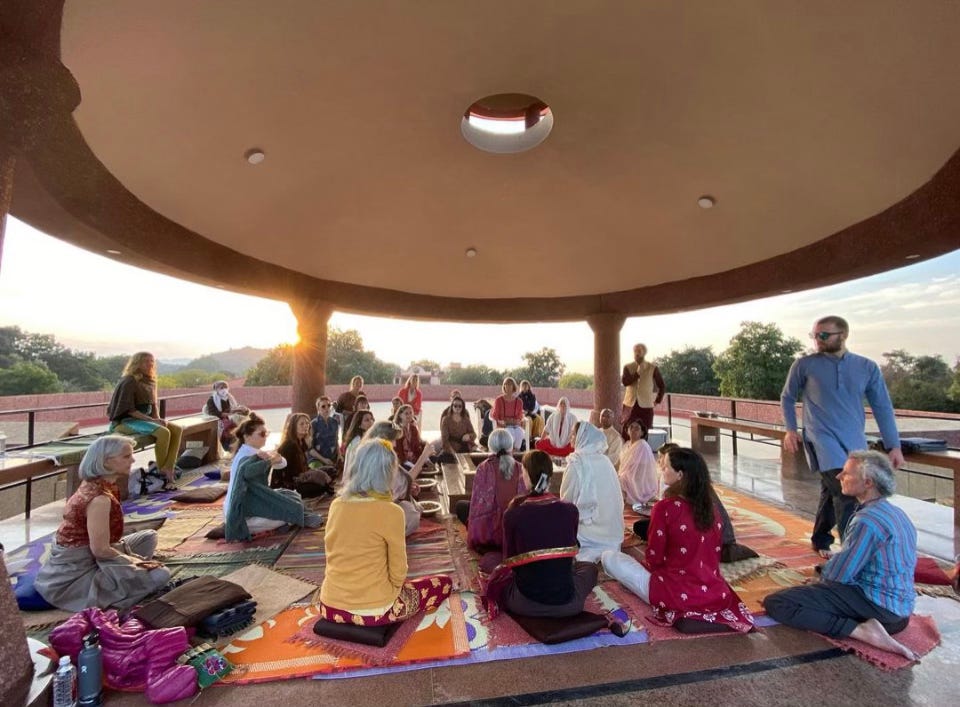
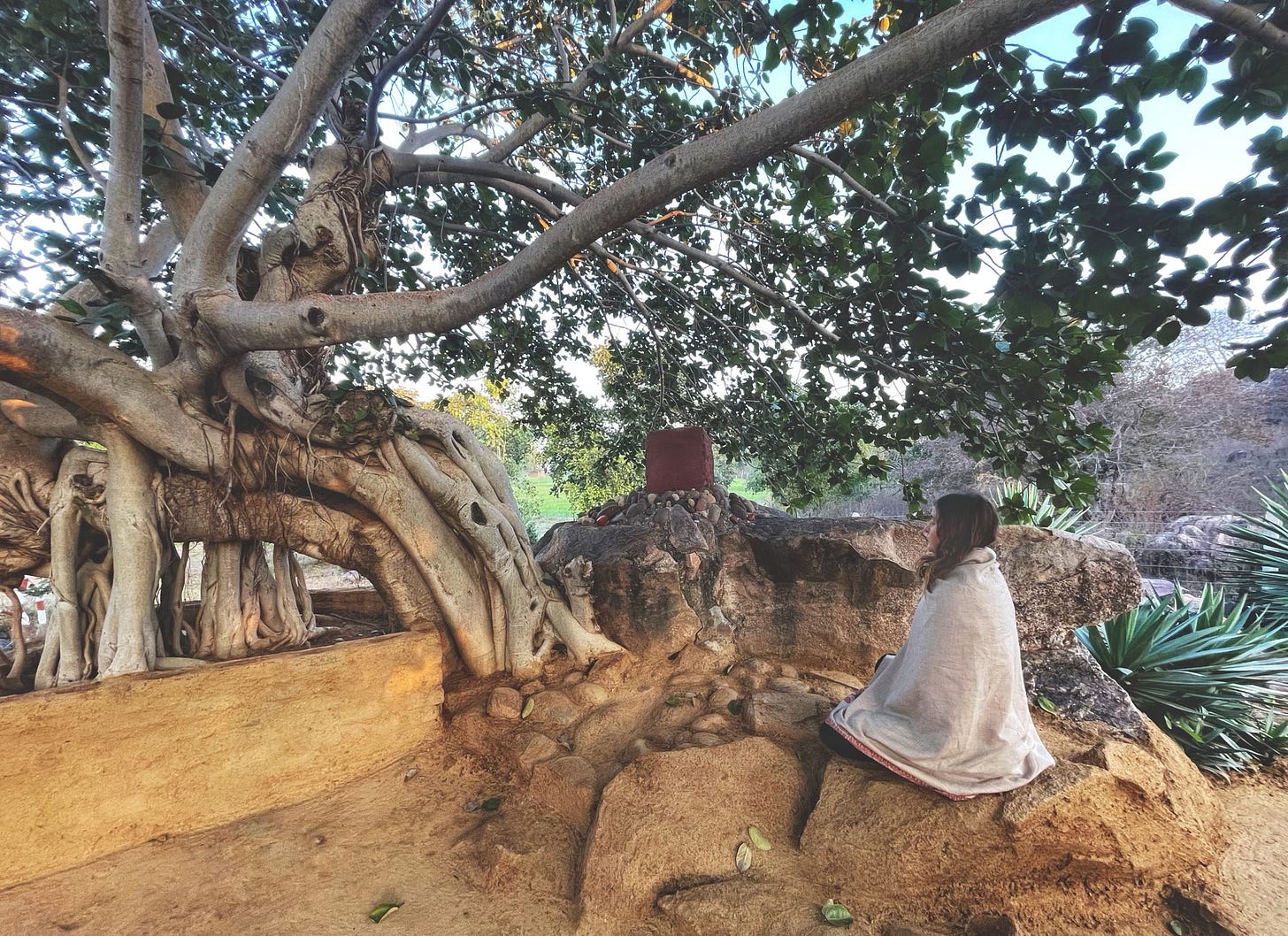
It’s interesting to me, but my immediate thought/response to this question is: “Right here, right now.”
I guess that is because as much as I love wandering/traveling (and I truly do), I truly love my life here in Madison with my family, friends, etc..
Maybe it’s because I’m in my 50’s and I had my kids late, but I can here the clock ticking in the background of my days and it all just seems so ephemeral…
Thank you for sharing, Jessica